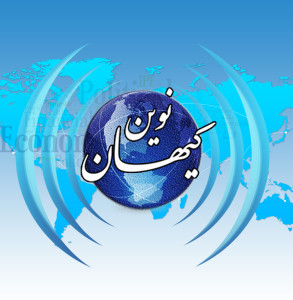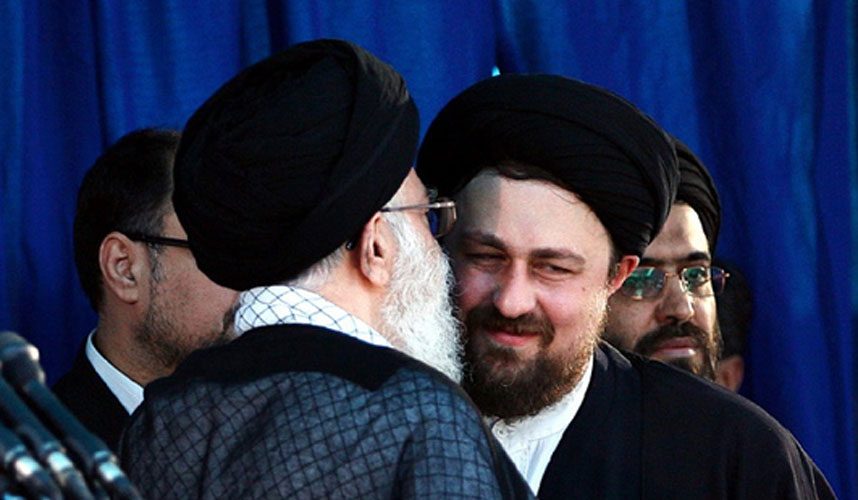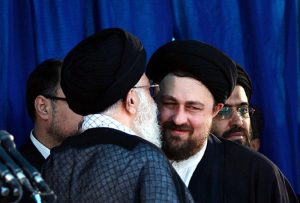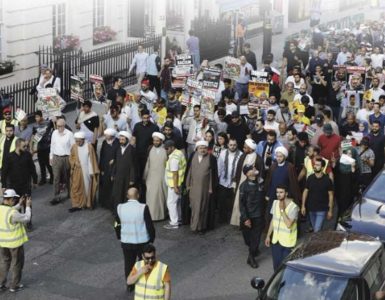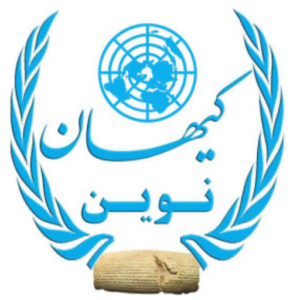اغراقآمیز نیست اگر بگوییم شکافها و ریزشهایی در ساختار رژیم جمهوری اسلامی به جود آمده و رهبران آن از راههای مختلف تلاش میکنند از علنی شدن این ریزشها جلوگیری کنند.
It is not an exaggeration to say that there are cracks and cracks in the structure of the Islamic Republic of Iran and its leaders are trying to prevent these cracks from becoming public in various ways.
کیهان نوین: گذشت نزدیک به چهار ماه از آغاز جنبش سراسری ایرانیان و تبدیل آن به یک نیروی واقعی نه تنها ثبات و استقرار جمهوری اسلامی را مختل کرده بلکه باعث تشدید نگرانی مقامات رژیم در مورد بقای آن شده است. رژیم تهران برای جلوگیری از ادامه جنبش ابتدا از روشهای گوناگون ارعاب و سرکوب استفاده کرد و سپس به همه نخبگان خود اعم از اصلاحطلب، میانهرو و اصولگرا درباره خطر سقوط جمهوری اسلامی هشدار داد.
اعدام اکبری در این مرحله، پیامی بسیار قوی و واضح برای شمخانی، لاریجانی و قالیباف رئیس مجلس شورای اسلامی فعلی دارد که برای کمک گرفتن از رهبران اصلاحطلب، اعتدالگرا یا خانوادههای خمینی و هاشمی رفسنجانی و ارتباط آنها با برخی نیروهای اجتماعی و دعوت از نخبگان سیاسی و یا شنیدن نظرات آنها و برای یافتن راهی جهت خروج از بحران کنونی رژیم و پر کردن شکاف میان مردم و نظام تلاش میکنند.
تصمیم به اعدام علیرضا اکبری معاون سابق وزیر دفاع جمهوری اسلامی ایران که بیش از سه سال به اتهام جاسوسی در بازداشت بسر میبرد، شاید یکی از روشهای بازدارندگی رژیم برای ارعاب مقامات سیاسی خود و جلوگیری از جدایی یا حتی فکر کردن به جدایی از ساختار رژیم یا حمایت از معترضان باشد.
گذشت نزدیک به چهار ماه از آغاز جنبش سراسری ایرانیان و تبدیل آن به یک نیروی واقعی نه تنها ثبات و استقرار جمهوری اسلامی را مختل کرده بلکه باعث تشدید نگرانی مقامات رژیم در مورد بقای آن شده است.
جنبش سراسری ایرانیان اکنون دیگر مرزهای داخلی را درنوردیده و رژیم اسلامی که قادر به مهار کردن آن نیست، هزینه عدم پاسخگویی به خواستههای عینی و موضوعی مردم را که بلافاصله پس از کشته شدن مهسا امینی فرصتی دوباره برای طرح شدن یافت میپردازد.
رژیم تهران برای جلوگیری از ادامه جنبش ابتدا از روشهای گوناگون ارعاب و سرکوب استفاده کرد و سپس به همه نخبگان خود اعم از اصلاحطلب، میانهرو و اصولگرا درباره خطر سقوط جمهوری اسلامی هشدار داد.
محمود حسینی پور استاندار مازندران در اوایل آغاز بحران به این موضوع اشاره کرد و به مسئولان اصلاحطلب و اصولگرا هشدار داد که اگر در آینده اتفاقی برای نظام بیفتد هیچیک از آنها نمیتوانند از خشم مردم و مجازات فرار کنند و «اول از همه» اعدام خواهند شد.
با این حال هشدار این مسئول نه تنها از سوی تصمیمگیران ارشد رژیم در نظر گرفته نشد بلکه تعدادی از تندروهای رژیم و برخی از فرماندهان سپاه پاسداران انقلاب اسلامی همچنان به تهدید معترضان و مجازاتهای سنگین متوسل شدند. یکی از فرماندهان ارشد سپاه پاسداران ضمن تهدیدی گفت بحران کنونی «نشان داد که چه کسی در کنار ما و چه کسانی در مقابل ما ایستادهاند و آنها که در برابر ما ایستادهاند، در آینده پاسخگو خواهند بود».
تهدیدهای سپاه پاسداران پیامی آشکار برای همه کسانی به شمار میرود که به نحوی با معترضان ابراز همدردی کرده و از مطالبات برحق آنها حمایت نموده یا از مقامات بالاتر یعنی رهبر جمهوری اسلامی خواسته بودند که به خواستهای مردم گوش فرا دهد و با گرفتن تصمیمات جسورانه جلوی خشونتی را که توسط دستگاه ایدئولوژیک رژیم اعمال میشود بگیرد. پیام تهدید سپاه پاسداران شامل همه کسانی مانند رؤسای جمهوری از خاتمی و روحانی گرفته تا خانواده رفسنجانی و میرحسین موسوی که زمانی از زمامداران نظام جمهوری اسلامی بودند رسیدند. پیام تهدید سپاه همچنین شامل همه نخبگان فرهنگی، رسانهای و ورزشی و سیاستمداران سابق که اغلب آنها اکنون آشکارا از جنبش اعتراضی مردم ایران حمایت میکنند، شده است.
افزایش شکافها و تشویش و نگرانی از ریزشهای درونی رژیم زیر بار سنگین اعتراضات فزاینده و تشدید انتقادات از درون نهادهای حکومتی، رهبران رژیم را بر آن داشت تا دست به اقدامات قاطع تری بزنند.
به همین دلیل لایحه قانون ممنوعیت سفر مقامات سابق به خارج کشور توسط جلال رشیدی کوچی نماینده استان فارس تقدیم مجلس شورای اسلامی شد. این لایحه به بهانه حفظ اموال و اسناد مردم و کشور به عنوان یکی از روشهای اجرایی برای جلوگیری از شکافهای و ریزش درونی رژیم در حال تدوین است.
اما طرف دیگر ساختار رژیم اسلامی یعنی اردوگاه تندروهای «انقلابی» که با کنترل و مهندسی انتخابات ریاست جمهوری اسلامی، قانونگذاری وانتصاب مقامات قضایی یکدست بودن رژیم را احیا کردند، مجازات اعدام و پایان دادن به آینده سیاسی هر کسی را در نظر گرفتهاند که به فرار یا ایجاد تمایز به دور از اراده این اردوگاه فکر کند.
از این رو جناح تندرو رژیم جمهوری اسلامی تصمیم به اعدام اکبری یکی از مهرههای نزدیک به علی شمخانی دبیر شورای امنیت داخلی و عضو سابق تیم مذاکره کننده هستهای در زمان علی لاریجانی که ۳ سال پیش به اتهام جاسوسی برای بریتانیا دستگیر شده بود، صادر کرد.
تصمیم اعدام اکبری تنها به دایره اتهامات جاسوسی محدود نمیشود، بلکه به امور سیاسی کشور، مقامات ارشد کنونی رژیم و شخصیتهایی که با آنها کار میکنند، مربوط میشود.
اعدام اکبری در این مرحله، پیامی بسیار قوی و واضح برای شمخانی، لاریجانی و قالیباف رئیس مجلس شورای اسلامی فعلی دارد که برای کمک گرفتن از رهبران اصلاحطلب، اعتدالگرا یا خانوادههای خمینی و هاشمی رفسنجانی و ارتباط آنها با برخی نیروهای اجتماعی و دعوت از نخبگان سیاسی و یا شنیدن نظرات آنها و برای یافتن راهی جهت خروج از بحران کنونی رژیم و پر کردن شکاف میان مردم و نظام تلاش میکنند.
به این ترتیب، تصمیم به اعدام اکبری نشان میدهد که نبرد تسویه حسابهای سخت در اردوگاه تندروها و نزاعی جدی در میان جناحین رژیم بر سر دوره انتقالی و روند انتخاب رهبر جدید پس از مرگ خامنهای آغاز شده و فصلی خونین در پیش خواهد داشت.
*منبع: روزنامه شرق الاوسط
*ترجمه و تنظیم از کیهان نوین
New Universe:
Almost four months have passed since the beginning of the nationwide movement of Iranians and its transformation into a real force has not only disrupted the stability and establishment of the Islamic Republic, but has also intensified the regime authorities’ concern about its survival. To prevent the continuation of the movement, the Tehran regime first used various methods of intimidation and repression, and then warned all its elites, including reformists, moderates, and fundamentalists, about the danger of the fall of the Islamic Republic.
– At this stage, Akbari’s execution has a very strong and clear message for Shamkhani, Larijani and Qalibaf, the current head of the Islamic Council, to seek help from reformist, moderate leaders or the families of Khomeini and Hashemi Rafsanjani and their connection with some social forces and inviting elites. political or listening to their opinions and trying to find a way out of the current crisis of the regime and to fill the gap between the people and the regime.
The decision to execute Alireza Akbari, the former Deputy Minister of Defense of the Islamic Republic of Iran, who has been in custody for more than three years on charges of espionage, is perhaps one of the regime’s deterrent methods to intimidate its political officials and prevent separation or even thinking about separation from the regime’s structure. Support the protesters.
Almost four months have passed since the beginning of the nationwide movement of Iranians and its transformation into a real force has not only disrupted the stability and establishment of the Islamic Republic, but has also intensified the regime authorities’ concern about its survival.
The nationwide movement of Iranians has now invaded the internal borders and the Islamic regime, which is not able to contain it, is paying the price of not responding to the objective and objective demands of the people, which immediately after the death of Mehsa Amini found a new opportunity to be proposed.
To prevent the continuation of the movement, the Tehran regime first used various methods of intimidation and repression, and then warned all its elites, including reformists, moderates, and fundamentalists, about the danger of the fall of the Islamic Republic.
Mahmoud Hosseinipour, the governor of Mazandaran, mentioned this issue at the beginning of the crisis and warned the reformist and principled officials that if something happens to the system in the future, none of them will be able to escape the people’s anger and punishment, and they will be executed “first of all”. .
However, the warning of this official was not taken into account not only by the regime’s senior decision-makers, but also some of the regime’s extremists and some commanders of the Islamic Revolutionary Guard Corps continued to threaten the protesters and impose heavy punishments. One of the senior commanders of the Revolutionary Guards said that the current crisis “has shown who is standing by us and who is against us, and those who stand against us will be held accountable in the future.”
The threats of the Revolutionary Guards are a clear message to all those who expressed sympathy with the protesters and supported their demands or asked the higher authorities, the leader of the Islamic Republic, to listen to the people’s demands and prevent violence by making bold decisions. which is applied by the ideological apparatus of the regime. The message of the IRGC’s threat including all the presidents, from Khatami and Rouhani to the Rafsanjani family and Mirhossein Mousavi, who were once leaders of the Islamic Republic, arrived. The IRGC’s threat message also includes all cultural, media and sports elites and former politicians, most of whom now openly support the Iranian people’s protest movement.
The increase in divisions and anxiety and concern about the internal collapse of the regime under the heavy burden of increasing protests and intensifying criticism from within the government institutions prompted the regime’s leaders to take more decisive measures.
For this reason, the bill prohibiting former officials from traveling abroad was submitted to the Islamic Council by Jalal Rashidi Kochi, representative of Fars province. This bill is being drafted under the pretext of preserving the property and documents of the people and the country as one of the implementation methods to prevent the cracks and internal collapse of the regime.
But the other side of the structure of the Islamic regime is the camp of “revolutionary” extremists who, by controlling and engineering the presidential elections of the Islamic Republic, the legislation and the appointment of judicial officials, restored the uniformity of the regime, they have considered the death penalty and ending the political future of anyone who escapes. or create a distinction far from the will of this camp to think.
Therefore, the extremist wing of the Islamic Republic of Iran decided to execute Akbari, one of the close associates of Ali Shamkhani, the secretary of the Internal Security Council and a former member of the nuclear negotiating team under Ali Larijani, who was arrested 3 years ago on charges of spying for Britain.
The decision to execute Akbari is not only limited to espionage charges, but also related to the political affairs of the country, the current senior officials of the regime and the personalities who work with them.
Akbari’s execution at this stage has a very strong and clear message for Shamkhani, Larijani and Qalibaf, the current Speaker of the Islamic Council, to seek help from reformist, moderate leaders or the families of Khomeini and Hashemi Rafsanjani and their connection with some social forces and inviting political elites. or listening to their opinions and trying to find a way out of the current crisis of the regime and to fill the gap between the people and the regime.
In this way, the decision to execute Akbari shows that a tough settlement battle in the extremists’ camp and a serious fight among the regime’s factions over the transition period and the process of choosing a new leader after Khamenei’s death has begun and will have a bloody season ahead.

